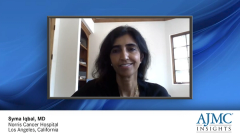
Aligning ESCC and GI Cancer Treatment Strategies With Current Guidelines
A medical expert discusses treating patients with ESCC and GI cancers as recommended by current FDA and NCCN guidelines.
Episodes in this series

Syma Iqbal, MD: It has become a difficult scenario for clinicians because the FDA guidelines and the FDA approvals for the incorporation of immunotherapy into the frontline setting isn’t consistent with the NCCN [National Comprehensive Cancer Network] guidelines. This has made it somewhat difficult for clinicians to talk to patients who ask for immunotherapy.
The NCCN guidelines followed strict criteria in the context of looking at the primary end points of the clinical trials as they were designed. CheckMate 649 was designed to primarily look at patients who had a CPS [combined positive score] of 5 or greater. In subgroup analysis, specifically looking at CheckMate 649, it appears that patients who had a CPS of less than 5 likely didn’t have a significant response to treatment as opposed to patients who [had a score of] 5 or greater. It has put clinicians in a bad position because these drugs are approved, and patients come [into the clinic] asking for these drugs.
Usually, the approach that I take in my practice is I counsel these patients about the available data. If they truly have a PD-L1 CPS score of 0, I counsel the patients to take another approach in terms of treatment, because adding the potential toxicity of immunotherapy for a patient who likely isn’t going to benefit from the addition of that drug doesn’t seem worth the risk. When patients have a CPS in the 1 to 4 range, it becomes a more difficult conversation. I try to counsel those patients in accordance with those data. But many times, particularly in younger patients and when we’re concerned about a patient’s ability to go toward further therapy down the line, we’ll wind up trying to give those patients immunotherapy as well.
I also want to be clear that the patient populations for CheckMate 649 were HER2 negative. The HER2-positive population is a different entity. The FDA approved the addition of pembrolizumab for the frontline treatment of HER2-positive patients based on KEYNOTE-811. That’s regardless of PD-L1 CPS. But if you look at the data, patients who had a low PD-L1 CPS seemed to benefit from therapy. The disease control rate was upward of 90%. There are more data to come in that population. But that’s generally the approach I take in the HER2-negative population. If they have a CPS of less than 5, I try to counsel them. If they have a score of 0, I try not to give them immunotherapy. But [if they have a score of] 5 or above, we incorporate it into care.
Transcript edited for clarity.
Newsletter
Stay ahead of policy, cost, and value—subscribe to AJMC for expert insights at the intersection of clinical care and health economics.












